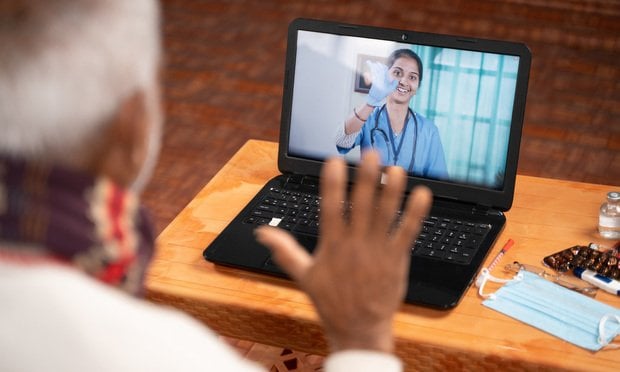 While Google says it willcontinue to ring-fence the patient data, critics say the potentialfor abuse is significant. (Photo: Shutterstock)
While Google says it willcontinue to ring-fence the patient data, critics say the potentialfor abuse is significant. (Photo: Shutterstock)
Three years ago, artificial intelligence company DeepMindembarked on a landmark effort to transform health care in the U.K.Now plans by owner Alphabet Inc. to wrap the partnership into itsGoogle search engine business are tripping alarm bells aboutprivacy.
|Data protection advocates cried foul when thecompany reversed course on an earlier pledge to keep DeepMindHealth, which taps millions of British medical records to monitorand diagnose disease, separate from Google. This month Alphabetsaid it plans to consolidate the businesses.
|Related: Facebook is entering the world of love, but whatabout health care?
|While Google says it will continue to ring-fence the patientdata, critics say the potential for abuse is significant: What ifthe company later backtracks and pairs medical records with itssearch engine and Gmail app, which harbor extensive information onusers' daily lives? That would present a formidable risk toprivacy, they say, and could cost patients and providers dearly ifthe company converted the data into high-priced products.
|“Google turns patient data into secret intellectual propertythat ensures treating future patients will be very, veryexpensive,” said Deborah Peel, head of Patient Privacy Rights, aU.S.-based advocacy group. “Corporations are governed by profitsand Google Health is all about profits.”
|Streams App
Google will help bring DeepMind Health's benefits to more peoplearound the world faster than it could have ever accomplished on itsown, said Dominic King, a former surgeon in the U.K.'s NationalHealth Service who served as the unit's top doctor and helpeddevelop an app, called Streams, for tracking severe kidney injury.DeepMind Health is also developing systems for predicting eyedisease and breast cancer risk.
|“I am excited to see our vision for Streams to become a realityat scale,” said King, who's transferring into the new Google Healthunit, in an email.
|DeepMind said it processes patient data only at the behest ofthe hospitals it works with and all records are held in a centernot run by Alphabet, where it is “separated at all times from anyother data.” The merger wouldn't change this arrangement withoutagreement from the hospitals. Google said it stands by DeepMind'sposition.
|“We are currently talking to our NHS partners to plan for thetransition of our contracts and this cannot take place without ourpartners' consent,” King said.
|Questions about DeepMind's partnership with the NHS date to2016, when critics asked whether the company had obtained patients'consent to use their records for its development projects. At thetime, DeepMind co-founder Mustafa Suleyman said that “at no stagewill patient data ever be linked or associated with Googleaccounts, products or services.”
|Privacy watchdog
Last year, the U.K. government privacy watchdog said an NHShospital had illegally sent 1.6 million patient records to DeepMindto develop Streams, fanning public fears about data safety. InJune, a group of outside experts DeepMind Health appointed toscrutinize its work urged the unit to “entrench” its separationfrom Alphabet.
|After the consolidation with Google was announced, Julia Powles,a researcher at New York University School of Law and a critic ofDeepMind's work with the NHS, scorched the reversal.
|“DeepMind said it'd never connect Streams with Google,” shewrote. “The whole Streams app is now a Google product! That is anatrocious breach of trust.”
|The controversy could complicate Alphabet's efforts tocommercialize its disparate health-related projects in a unifiedpush. Earlier this month, the company announced it was hiring DavidFeinberg, chief executive officer of Geisinger Health System, oneof the U.S.'s largest health services organizations, to run the newGoogle Health division. Earlier in the year its Google Clouddivision hired Toby Cosgrove, former CEO of the ClevelandClinic.
|Alphabet is one of many companies anticipating the enormousimpact of Big Data in health care, said Eric Topol, chairman ofinnovative medicine at Scripps Health in San Diego. Google's VerilyLife Sciences project and DeepMind have both been collecting vastamounts of patient information to design and automate care systems.Putting them side-by-side widens the possibilities for innovation,Topol said.
|“When you're taking on health records on millions of people, whynot extract other information that might be useful for clinicians?”he said in a telephone interview.
|Hospitals, doctors
Alphabet wants to match rivals' major investments in health,according to Jeff Becker, a senior analyst at Forrester Research.While Apple Inc. has targeted consumers and insurance companies,and Amazon.com Inc. is courting companies that provide employees'medical insurance, Google seems to be gearing initiatives towardhospitals and doctors, he said.
|Google ended a four-year project with Novartis to develop bloodsugar-sensing contact lenses for diabetics, a sign of waningappetite for health projects unlikely to generate revenue. Mergingthe DeepMind unit into Google Health makes business sense, Beckersaid.
|“DeepMind is a research team,” he said. “Google is better set upto scale and monetize health-care apps.”
|Still, the change of course could harm tech initiatives if itbreeds distrust of Big Data companies, said Arthur Caplan, head ofmedical ethics at the New York University School of Medicine. Italso highlights the need for tougher regulation of privacy lapsesand abuses, he said.
|“I want to see some stiff penalties for violating privacy,” hesaid in a telephone interview. “If it doesn't carry penalties itisn't useful.”
|Read more:
- Tech giants pledge to reform health caredata
- Trade privacy for lower premiums? Youngergenerations say yes.
- Privacy concerns in Amazon and Aetna-CVS healthdeals
Copyright 2018 Bloomberg. All rightsreserved. This material may not be published, broadcast, rewritten,or redistributed.
Complete your profile to continue reading and get FREE access to BenefitsPRO, part of your ALM digital membership.
Your access to unlimited BenefitsPRO content isn’t changing.
Once you are an ALM digital member, you’ll receive:
- Critical BenefitsPRO information including cutting edge post-reform success strategies, access to educational webcasts and videos, resources from industry leaders, and informative Newsletters.
- Exclusive discounts on ALM, BenefitsPRO magazine and BenefitsPRO.com events
- Access to other award-winning ALM websites including ThinkAdvisor.com and Law.com
Already have an account? Sign In
© 2024 ALM Global, LLC, All Rights Reserved. Request academic re-use from www.copyright.com. All other uses, submit a request to [email protected]. For more information visit Asset & Logo Licensing.








